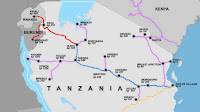End of the road for Al-Shabaab Economics is nigh
 |
| These Goons are used to perpetuate Shabanomics |
BY THE LOOK OF THINGS, Shabanomics, or
should we say Economics of terrorism, is crumbling. And it will leave behind a string
of Orphans.
Shabanomics or Economics of terrorism is a conglomeration of
illegal economic activities including:smuggling of contraband goods, piracy; tax evasion and tax avoidance; extortion;recruitment and training of suicide
Bombers; recruitment of Scouts; poaching; bribery and kidnappings for ransom.
These activities thrive in failed states.
These activities thrive in failed states.
Consequently, such criminal elements
fight tooth and nail to sustain failed states in such a condition for once
circumstances change; the criminals find no hiding place.
This is the prospect facing
Al-shabaab, the al-Qaeda affiliated terrorist gang and its “children” in East
Africa. It was born and bred in Somalia during the years of lawlessness in that
country. In its heyday, the Red sea and India Ocean were dangerous place for
shippers due to piracy. Many Somali Pirates were killed or arrested and ransom
running into billions of US dollars was paid. Nairobi’s Wilson Airport was the
exit point for ransom Money.
There is no evidence linking
Al-Shabaab direct with piracy. But there is evidence that it received some 20
per cent protection Money from the Pirates. Therefore, although Al-Shabaab may
not have had Pirates of its own, it encouraged many to be come pirates and hide
hijacked ships in the Ports it controlled in for a fee.
Al-Shabaab had also taken control of
the Kismayou Port in Somalia through which it smuggled contraband, including
small arms, into Kenya through Eastleigh estate in Nairobi, Kenya. It earned an
estimated US$250,000 every month from import tax levied on the use of Kismayou
port. It also made a fortune from exporting charcoal through the port.
Al Shabaab is also suspected to be involved
in poaching of Kenyan elephants and Rhino in a bid to finance its operations.
Investigators have established direct links between Somalis and the increased
poaching in Kenya. Somalis leaving in Kenya are the brokers and, it is
suspected, they also have links with Al-Shabaab since the Ivory is exported
through Al-Shabaab controlled Ports in Somalia. The consignments are also escorted
to the Ports by Al-shabaab militants in their “technicals.”-SUVs converted into
warfare vehicles. On this trade alone
 |
| The entry of KDF spoiled the party |
However, fortunes have been turning
against Al-Shabaab and its supporters and financiers. So when Some Politicians
accused the Kenya government of trying to “destroy the Somali economy in
Kenya,” they were right. The economics of disorder is clearly coming to close-
and many businesses will go under, leaving plenty of paupers (or are they
orphans?) in its wake.
But I am surprised that the
politicians found their mouth last week. It is too late in the day. The
destruction of the Somali type of economics began has been three years in
implementation.
The entry of the Kenyan Defense Forces also spawned the end of piracy. The land and sea blockade weakened Al-shabaab’s financial base and therefore its capability as a fighting force.
Although it’s international economics was crippled. The domestic side was still vibrant but was largely at stake. The domestic side included the sale of old stocks of contraband goods and sale of real estate bought with piracy money. Now both appear to be dwindling too and soon they could dry up.
Last year, Al-shabaab raided the Westgate Mall in Nairobi and killed 62 people. That was a mistake they probably now regret. Among the dead were the relatives of the new President Uhuru Kenyatta. Rather than being cowed down, the new government intensified its war on Al-Shabaab.
Kenya Air force jets began to strike Al-Shabaab bases deep in South Somalia. In series of attacks in the last week of October last year, two senior commanders were killed in a drone attack in Baraawe in South Somalia. Among the dead was a commander named Anta, a Bomb expert. Kenya Defense forces also assaulted an al-shabaab camp in “Jillip deep in South Somalia.”
 |
| Fleeing from KDF in Kismayou |
This destruction has caused panic among the ranks as some non-Somali commanders are said to have fled to Yemen. Al Shabaab responded by increasing insecurity in Kenya-bombing one place after another in Kenya which sparked off the on-going crackdown on Somalis in particular and illegal aliens in general.
This backlash was not entirely unexpected. Last year this writer warned in an article elsewhere that it was imminent. Read
The on-going lock down of Eastleigh, euphemistically called the little
Mogadishu, portends worse danger than just identifying and repatriating
undocumented Somalis back home. It also includes identifying and arresting
potential terrorists and with about 20 bank accounts being investigated for
financing Al-shabaab, the death knell for their economy is just about to be
sounded. It is the final stroke that broke the Carmel’s back.
That is why the noise is very loud for it could also expose politicians who
are beneficiaries of al-shabaab largesse since some wealthy Somalis and Arabs
are to finance Al-Shabaab. Their money could also have funded the campaigns of
some politicians in Kenya.
In 2011 when the first bombs hit Nairobi, Somalis found themselves despised
by other Kenyans. It took the government intervention to save them from
outright discrimination. Should it be established that some of the business
from where Kenyans buy cheap merchandise also finance al-shabaab, then; the end
for such businesses will have come. Nairobi is apparently the last stop before
Al-shabaab‘s demise.



Filing your taxes is simply a means of registering this process officially. For businesspersons, it is their responsibility to quote how much they earn from their business and to pay taxes on their income accordingly.
ReplyDeleteIssacqureshi Non-Executive Director